Strengthening the resilience of rural women in COVID-19 times
June 4, 2020
by Erica Lee
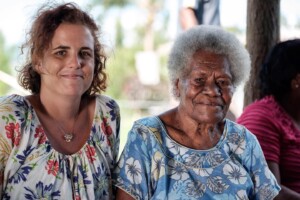 “In times like these, we reflect on powerful lessons learned from women in our partner communities. How to go by faith, how to show solidarity, how to celebrate, and how to grieve. Amidst the chaos of the novel coronavirus (COVID-19) pandemic and recent tropical cyclone, women in our program remind us constantly of their leadership role in upholding culture and how it creates a resilient framework.”
“In times like these, we reflect on powerful lessons learned from women in our partner communities. How to go by faith, how to show solidarity, how to celebrate, and how to grieve. Amidst the chaos of the novel coronavirus (COVID-19) pandemic and recent tropical cyclone, women in our program remind us constantly of their leadership role in upholding culture and how it creates a resilient framework.”
Janet Lotawa, Co-Founder of social enterprise Rise Beyond the Reef (RBTR) reflects on the importance of maintaining ties with the 350 rural women artisans (from 23 villages from Ba, Ra, Macuata and Nairai) that her organisation has partnered with over the past seven years.
Following global news of the pandemic, Janet and Director/Co-founder Semi Lotawa knew it was only a matter of time before the impacts of COVID-19 reached our shores. In mid-February, they had already begun preparing their partner communities to brace for what was to come. They sent out pleas to the development community and private sector, urging them to continue to support rural artisans.
COVID-19 and TC Harold Impact on rural communities
On March 19, following the announcement of the first COVID-19 case, Lautoka City was immediately placed on lockdown with two checkpoints set up on the borders of the city to restrict movement and contain any possible spread to other parts of Fiji.
“In a small economy like Fiji, COVID-19 hit hard and fast and although we would like to think we were prepared for this day, diversifying our markets by venturing into online sales, nothing could have prepared us for what was to come,” said Janet.
Although one might assume rural remote subsistence communities in Fiji are more immune to external shocks like the COVID-19 related global economic depression, the ripple effects can push them further into the fringes of development.
Job losses and pay cuts of relatives living in towns mean they are no longer able to send remittances to their villages. Rural communities have been locked out of stimulus packages available to Fijians and their access to information and other opportunities are limited by their remoteness. Rural dwellers are typically classified as the informal sector and often do not contribute to pension schemes which they could have accessed to subsidise lost incomes. To exacerbate matters, many water sources in these communities have become contaminated after tropical cyclone Harold leading to sickness and death and again their remoteness excludes them from access to immediate health care.
Finding solutions to challenges over the past three months
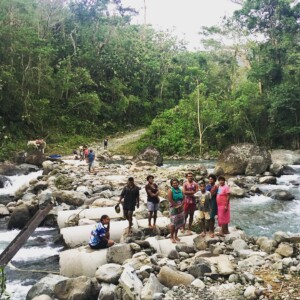 For an organisation that believes in the principles of farm gate purchasing (paying market value), the lockdown brought new challenges for RBTR which has its office located in Sabeto (outside Nadi) but whose partner communities live on the other side of the Lautoka borders.
For an organisation that believes in the principles of farm gate purchasing (paying market value), the lockdown brought new challenges for RBTR which has its office located in Sabeto (outside Nadi) but whose partner communities live on the other side of the Lautoka borders.
“Those two weeks during the lockdown were extremely difficult for our communities. Many of their families are farmers who sell their produce in Lautoka – the biggest market in the West. They tried to adapt by selling items at the Ba market but many ended up having to return to their villages with unsold produce,” says Janet.
On a normal day, just reaching the upper mountain Ba communities can be difficult with rough terrains and gravel roads. During the lockdown, their remote location was further exacerbated by heavy rain and Tropical Cyclone Harold that washed away bridges, destroyed crops and caused landslides, thus blocking off their access to much needed outside assistance.
RBTR also worked with various Fijian Government agencies such as the District and Provincial Offices, development agency such Oxfam Pacific via its Raising Pacific Voices Coalition and Shifting Power Shifting Voices and women’s fund – Urgent Action Fund for Asia and the Pacific to provide food rations and COVID-19 prevention kits to communities. The kits contain washable masks (made by RBTR), latex gloves and COVID-19 awareness infographic flyers containing information on how to prevent the spread of the virus.
By the end of March, COVID-19 movement restrictions and the suspension of many regular bus services made it harder for many communities to easily access basic food items not available in their communities. On a fortnightly basis, RBTR made the journey to their communities in big carriers (trucks) to minimise their need to travel to the cities (Lautoka and Suva) thus putting them at risk of catching the virus and incurring costly transportation just to get items like two kilograms of sugar. Food rations were bought with money RBTR had fundraised on Facebook, through its Silver lining program (adopt a needy family through a fortnightly donation of FJD $37.98). Originally intended for COVID-19 relief for 634 families, RBTR has continued to fundraise to help subsidise the income of their partner communities due to the lack of prime market access for their crops. RBTR has so far supported 450 families.
In early February RBTR partnered with the ANZ Bank Staff Foundation to start a Farm Food Bank aimed at supplying crop cuttings such as kumala (sweet potato), bele (local spinach), and other raised seedlings short term to promote and bolster food sovereignty for upper mountain remote partner communities. The project has been extended with communities now setting up communal spaces to raise seedlings and mass propagate a diverse range of root and vegetable crops.

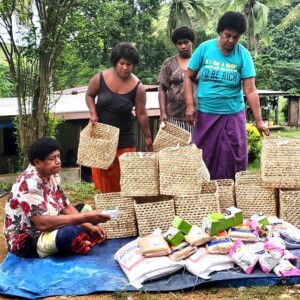
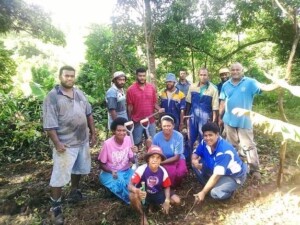
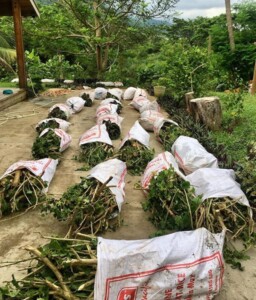
Adapting to the changes in the market
With the tourism industry now in limbo, RBTR and its partner communities lost its main income source. Innovating with products and creative marketing was key to RBTR’s strategy to stay afloat where many small businesses were closing around Fiji. For example, with the shortage of protective equipment available in Fiji such as face masks, RBTR was one of the many small businesses that quickly adapted its product line to include face masks and hygiene products.
Capitalising on Mother’s Day buying trends, RBTR sold hamper boxes that included new tote bag designs, Fijian recipe cards and small packs of herbs and spices centred around wellness and boosting immunity. RBTR’s latest product is a table cloth/wall hanging that is also being marketed as a cool backdrop for zoom calls.
RBTR was also recently announced as one of six innovative social impact enterprises that received seed capital of US $10,000 from the United Nations Development Programme’s (UNDP) Pacific Response: Sustainable Livelihoods Challenge. The initiative was a collaboration between the UNDP Accelerator Lab Pacific, V-Lab incubator, the Fiji Ministry of Commerce, Trade, Tourism and Transport, ANZ Bank, StartSomeGood, and supported by the Australian Government. The money will be used to help purchase equipment for value adding.
After distributing the first lot of COVID-19 prevention kits, RBTR saw the need to further develop the kit to include wellness/livelihoods items for rural women. The new kits will include washable sanitary pads, face masks, fishing gear, handmade soap, wellness/immunity-boosting supplements (ginger, turmeric, limes), plant-based anti-fungal/antiseptic sprays and more. All of the items/products will be sourced from or made by women in the program. The kits will also contain women’s resource information (sexual reproductive health rights) and instruction booklets on how to use local plants and herbs for wellness (DIY infographics).
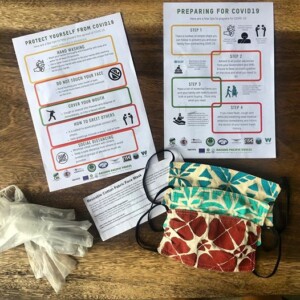
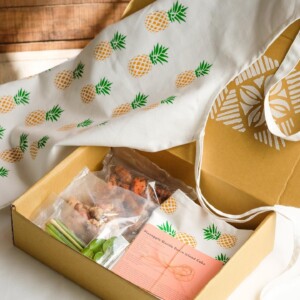

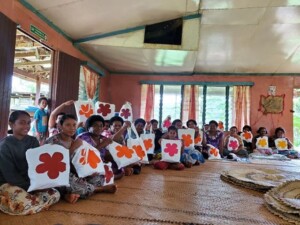
Where to from here
 Under the current backdrop, RBTR has not been able to maintain it’s normal monthly purchasing of FJD $20,000 of products from partner communities and will not be able to sustain the 80% self-funded operational budget that it was able to achieve last year. However RBTR is trying to buy as much as it can and makes up for the shortfall through the provision of resources and food rations which has amounted to FJD $30,000 over the past two months.
Under the current backdrop, RBTR has not been able to maintain it’s normal monthly purchasing of FJD $20,000 of products from partner communities and will not be able to sustain the 80% self-funded operational budget that it was able to achieve last year. However RBTR is trying to buy as much as it can and makes up for the shortfall through the provision of resources and food rations which has amounted to FJD $30,000 over the past two months.
Despite the challenges that the two crises have brought, the women in partner communities have remained optimistic and grateful for the maintained partnerships. Janet recalled when RBTR was finally able to make the journey to the communities bringing much-needed supplies after the lockdown was lifted, especially before Easter. Upon arriving in the villages, RBTR was received with a “cerevi” and loud cheers – traditional Fijian practice of draping your finest mats on the vehicles of your visitors to show gratitude and blessing.
“This is why I don’t think we should “take a break” from buying from our partner communities or lay off staff. This is the time, more than ever that we need to be there for our partner communities. For many of the producers in our program, they are the primary earners for their families and rely on our support,” said Janet.
“We understand that everyone is mapping out their own situations and considering how to help their neighbours. We are all in this same boat together and I ask you to join us in supporting the isolated, unseen people of Fiji,” said Janet.
The Fiji Women’s Fund has over the past two years supported the core operational costs of RBTR and its programs to bolster product design and quality assurance. RBTR empowers rural women through training and leadership development, to take greater control of their lives by resisting traditional social structure and kinship norms that result in high rates of domestic violence. Income earned by rural remote women typically goes back into the community.
If you would like to support RBTR’s Community-Based COVID-19 Response, please visit their website: https://risebeyondthereef.org/donate/
Photo Credit: Janet Lotawa and Rob Rickman
Recent Whats New
Resilience and Sustainability in Action
October 28 2025
Nalini Singh Calls for Collective Feminist Resilience
October 28 2025
